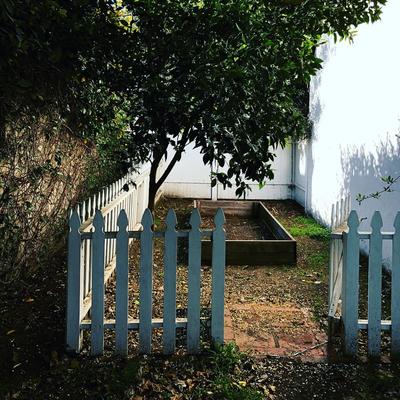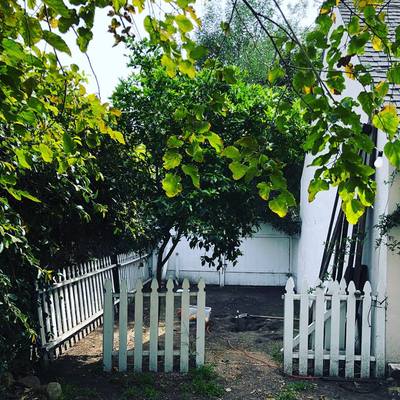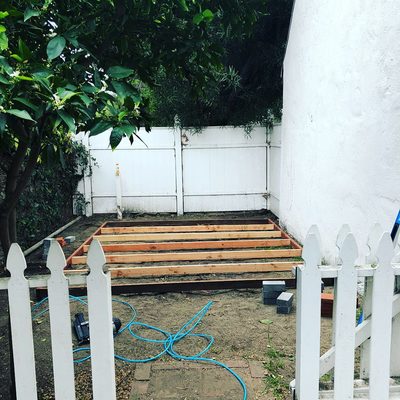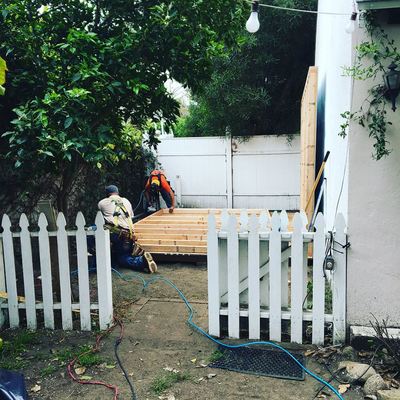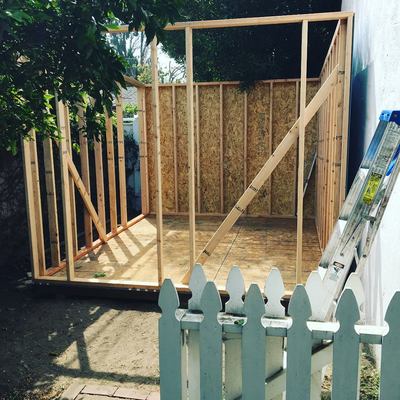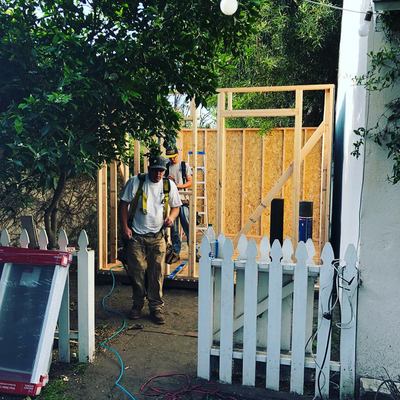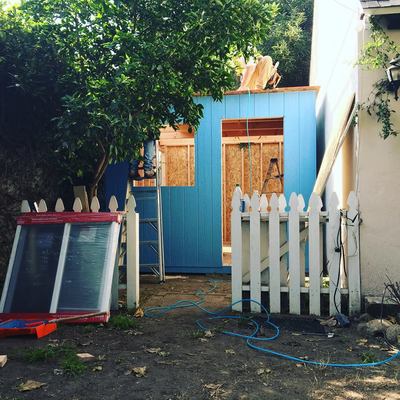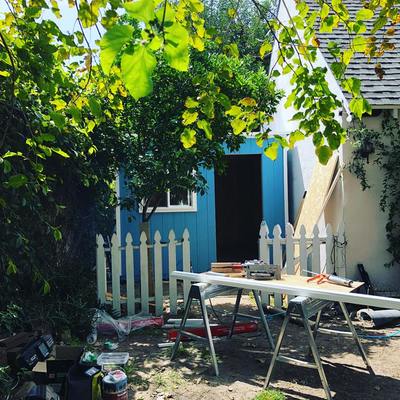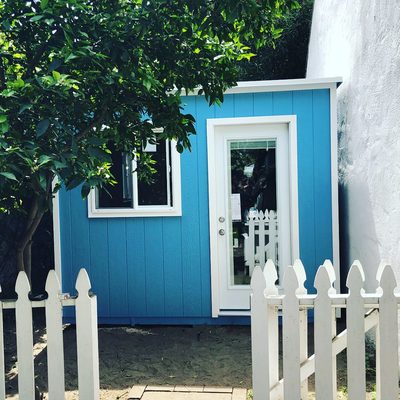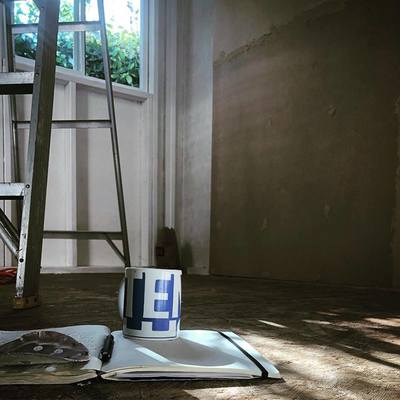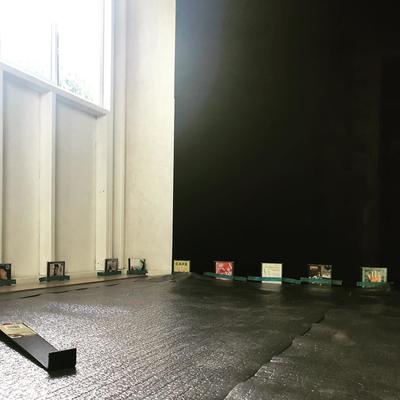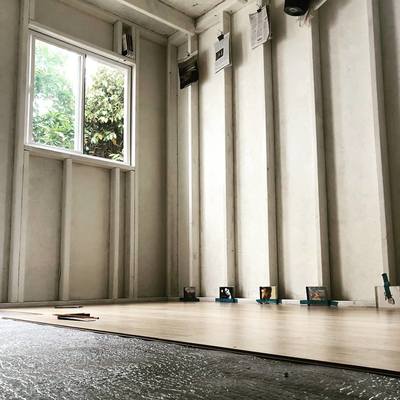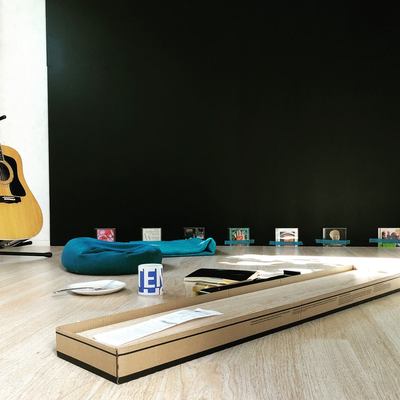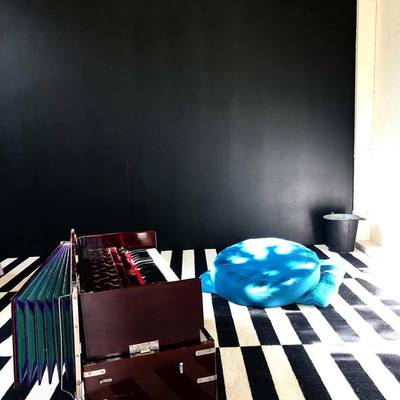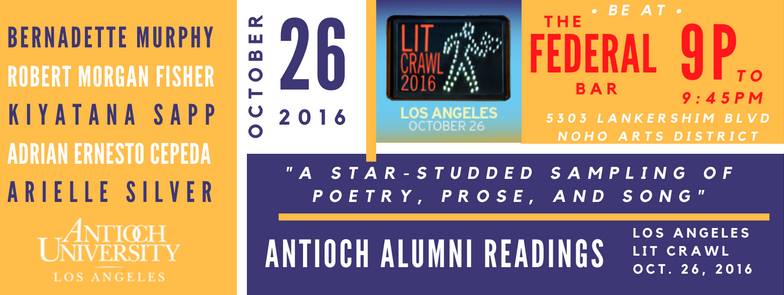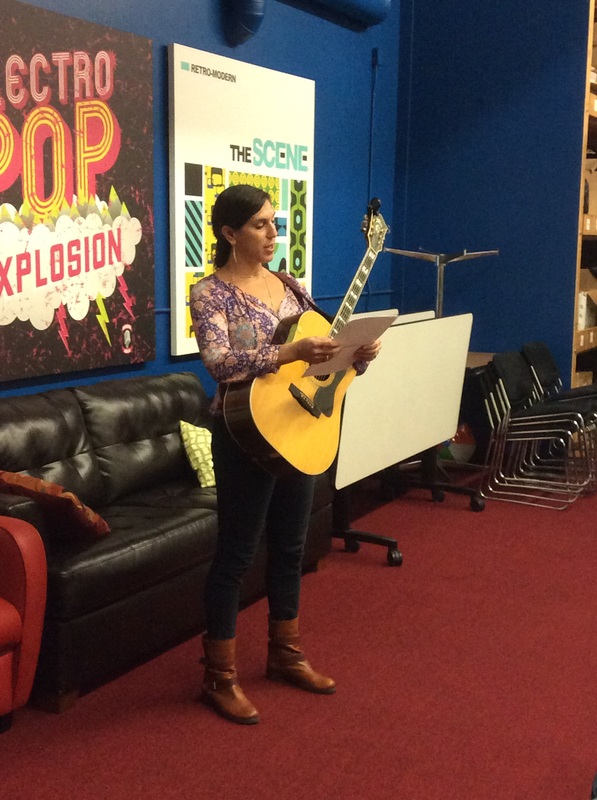|
In my early adulthood, with aspirations not for wealth but for creative fulfillment, I disciplined myself to live down to the bone. I nurtured thrifty tastes, saving my dimes for guitar strings and reeds. With my vegetarian diet, I shopped frugally, buying from the bulk bin, shopping in season and local, for a time splitting a $200 monthly rice and beans budget with a friend. I did not drink much alcohol, did not frequently dine out, did not indulge in fancy coffees or convenient sandwiches, did not buy frivolous clothes. Glad to finally enroll in what I fondly call Hogwarts School of Music, in my first semester at Berklee, instead of scrounging together $75 for a light-weight guitar gig bag, I drilled holes in my heavy hard-shell case and fashioned it with thick piano moving straps into something I could wear on my back. It was heavy, very heavy, particularly with my clarinet and laptop slung over my shoulders. I walked or took the T everywhere, and my back bent under the weight. In a recent newsletter to you, I wrote about raking up backyard leaves in a forgotten spot behind the garage, and my nascent vision of a cabin where I could practice my clarinet, try out song ideas, and work on essays and poems. It's been ages since I've had a room of my own, as Virginia Woolf wrote. I have long wished to sit in a windowed room and stare out the door at pale leaves as they unfurl into spring. I have wished for a room strong enough to withstand a thunder of ideas, because I have lately increasingly felt a rumble rolling through my heart, a heady mix of sound and emotion, art and media, questions and exploration. But I also wrote in that letter about fear of failure. I was worried about wasting money on something so specifically made by me for me. It felt a little arrogant: a playhouse for a grown woman who thinks she's got some talent or ideas worth the expenditure. What if I stepped into that arrogance, that audacity of hope (as Obama says), and nothing, in the end, comes? My fear might be rooted, in part, in an old Jewish superstition of the evil eye: If I do something so bold as build an artist studio just for myself, the heavens may train their unwanted attention on me, bringing tragedy to me or my loved ones. I should spit three times and hang a blue hamsa on the door. My frugality (always for my own desires, contrasted sharply, I hope, with my generosity for others) might also come from the valorization of parsimonious rationing in New England, where I lived for college and music graduate school, but whose culture I had admired since childhood. It suited the environmentalist in me: reduce, reuse, recycle. What throw-away materials might I re-fashion into use? How can I avoid purchasing newly manufactured goods, with their accompanying industrial waste and unneeded expense? But I bent beyond logic under the weight of that guitar case. I hadn't yet read Coleridge's The Rime of the Ancient Mariner, but I rued the albatross around my neck. The irony of it: that in my mid-twenties, finally glad to be at an incredible school and immersed in the study of music, I felt my instrument was a psychological curse I was tasked to bear. It took until my early thirties to examine the cliche of suffering for my art. Till then, I had accepted carte blance the stereotype of the starving artist. Looking back, I realize how easily I could have found $75 for a gig bag, saving my shoulders and neck a little of the physical pain that inevitably comes from the weight and repetitive motion of playing instruments. But I wanted so badly to be an artist, and from the stories I'd internalized, I thought suffering an essential part of a creative life. Fast forward to the past seven years, since Darby and the girls and I moved in together. It's a sweet house. Darby and I often say how glad we are that it isn't bigger. We want to stumble over each other, and engage with the teenagers even when they may prefer to sequester themselves in far off corners. The downside, though, is that I sometimes want to sequester myself away. As a musician, I need to make noise in order to get to the music. I am a lyrical writer, even in my prose, and tend to speak aloud every word as I write (even this, now). I've longed for a dedicated place where I can excavate my artist heart. A room of my own where I can throw ideas around, many ideas, because a good idea is not something that happens in isolation, but rather, comes out with dozens of bad-idea siblings. I've been yearning to throw spaghetti on the walls (I just love that phrase, don't you?) because something must eventually stick. Right? But what if nothing does? In this world of art as commerce, I have feared that the cost of building a little shed for myself won't find a return on the investment. And then I came across a passage in Elizabeth Gilbert's book Big Magic, where she writes, "Let me list for you some of the many ways in which you might be afraid to live a more creative life." This one struck hardest: "You’re afraid that someday you’ll look back on your creative endeavors as having been a giant waste of time, effort, and money." If a friend came to me with an idea, I would urge her to pursue it, to see where it will lead. In fact, after I wrote this post here, I heard from a number of you. Go for it! you said. The compounding encouragement was astounding. Your words amplified a desire deep inside me. So, this is all to tell you: I did it. It's a rule of cabins to have a name: Welcome to Seeds & Thunder, where on a daily basis I meditate, write, play music, and watch the pale leaves unfurl.
2 Comments
To calm my nerves and prep my mind for my performance tonight as part of the Los Angeles Lit Crawl, I invited my office colleagues into the pool room for a noontime 10-minute flash concert. It's actually the mail room, but a few years ago the company painted the walls Persian blue, put in new carpet, and installed a pool table and video game console. I'll deliver a song and a short story, I told them, and added that their presence would be a great service to me, as I haven’t performed in front of an audience in quite some time. It's actually been years since I've stood on stage and performed one of my songs. The invitation came from my hope to ease today's tension of what has been the duality throughout my life. On one side, my desire to sing, tell stories, and connect with an audience. On the other, nothing scares me more.
When: Today at Noon for 10 minutes Where: The Pool Room What: A Quick Practice Run of Tonight’s Song & Story Who: Me and You Why: Because, hey, it’s the entertainment business My earliest memories of singing are a collage: bath-time duos with my guitar-strumming dad; "Tomorrow" at the top of my lungs from the balcony at a Broadway show of Annie and, later, from the balcony of my grandparents' highrise; and, in Hebrew at my Jewish summer camp, "I'm Gonna Wash That Man Right Outta My Hair." Sometime between baths and camp, I learned shame and fear of being shamed. I internalized a philosophy that, at its essence, suggested that anything less than perfection was unworthy. Society? Parents? My own nature? Who is to say where I learned it. Stage fright is a bully. But I have songs and stories in my heart, and I am certain that if I don't answer their call, the incessant knocking will drive me mad. The anxiety was never as bad in orchestra and small chamber groups. I played classical and renaissance music from a young age through my mid-twenties, and frequently sat as first-chair in the college and community groups. In orchestra and wind ensembles, inevitably a solo line popped up here or there. I'd fret over those measures for minutes before they came, but I loved the sound of my singular clarinet soaring over the other winds and strings. Sitting in my formal black and white attire, I could be heard and not seen. When the momentary solo faded back into the wash of music, my nervousness calmed. I was just a vessel for the music amid the other players and a clutter of music stands. In my last year of college, I won a prestigious competition hosted annually by my university's music department. As the winner, I would be the featured soloist at the spring orchestra concert in an orchestral piece of my choosing: the Weber Concertino for Clarinet. Even more than the honor of winning, as soloist I had, for the first time, the opportunity to perform alongside an orchestra. Whereas in the past I'd only had piano accompaniment, for this I rehearsed alone and, later, in the concert hall with the full orchestra. In the throes of stage fright, I can never think clearly. I rehearse to perfection beforehand, in the hopes that in the moment I will be able to deliver a large fraction of that excellence. But rehearsal is not fear-proof. On the day of a performance, my stomach churns for hours, my legs feel numb. On stage, I sweat, I shake, I forget how to do the very thing I have practiced to flawlessness. But I fake it in the hopes that one day I will make it without fright. Unsurprisingly, as the days led up to the concerto performance, I was a wreck of jitters. I knew the concerto competition concert would be the most well-attended of the year. My parents and grandparents, none of whom later attended my college graduation, all flew in. A few days before the concert, I confessed my nervousness to my mentor, Sarah Mead, a beautiful viola da gamba player who had introduced me to Early Music my first semester and nurtured me through all four years like no one ever had. Sarah and I had both skipped grades in elementary school, and bonded over the lifelong sense that we'd missed some essential lesson only taught that particular year. She introduced me to the beautiful music books of the renaissance, with their four lines of music facing the four outer edges so that a family could sit around a table after dinner and play music together. Sarah knew I loved a challenge, and whenever our Early Music ensemble called for a new instrument, she gave me the task of learning: recorders, harp, krumhorns, flutes. Later, after I graduated, I couldn't bear to leave Sarah, so I continued to commute to campus for weekly rehearsals, until I finally moved away. The week of the concerto performance, Sarah told me about the first time her son Patrick played piano for an audience. He was around seven, and he was to play a solo piece as part of the university's celebration of composer and music department founder, Irving Fine. Sarah had worried about his nerves, but when she woke Patrick on the morning of the celebration, he sat up in bed with wide eyes and big grin. "Mommy," he said, "today's the day I get to play my song for everyone." That Sunday, while the orchestra played through the first half of the program, I sat in the green room smoothing my dress and repeating Patrick's words. "Today's the day I get to play my song for everyone." I thought over and over, my fingers shaking on my clarinet keys as I ran through arpeggios, my empty stomach clenching. "Today's the day I get to play my song." I heard the applause and walked onto stage. "Today's the day." I nodded to the conductor and he lifted his arms for the string opening. I am tempted to write more, to tell you how I wet the reed, how my first note rang in the hall, how playful the theme and variations felt tripping off my fingers, how the orchestra buoyed me, how the cadenza I'd written for the near-end felt like a braiding of my own music with Weber's. I am tempted, but I can't, because I don't remember any of it. I only remember feeling a profound sense of shame at the end. Nothing terrible had happened -- I didn't forget a line, my clarinet didn't squeak -- but I remember afterwards wanting to hide from the family and friends waiting in the hallway with bouquets in their arms. For years after that concert, I hid my accomplishment -- the competition, the performance -- convinced that I'd not deserved the recognition. Perhaps that year the competition had been slim. Perhaps I, a far cry from the winners of years past and future, was only the best they had that year. It should have been a glorious moment, a capstone to years of practice and study. But all I could think was that I'd had one chance for perfection, and I had not achieved it. Not long after, I packed away my clarinet. Meanwhile, sometime in college I started writing and singing songs. I wanted so badly for someone to listen, so after college I met my fright head on. I wanted to capture Patrick's joy at sharing something that he loved with others. Following the footsteps of my juggler boyfriend, I bought a busking permit at the Cambridge city hall and every weekend plugged my two-input amp into a car battery, laid out my guitar case for tips, and played for passersby in Harvard Square. When the air turned cold in early October, I donned a winter coat and fingerless gloves. When the Head of the Charles tourists left town, I turned to open mics at Club Passim, the Kendall Cafe, and other songwriter venues that have since closed. Over the years, I pulled together a band, I recorded, I toured. Stage fright still gnawed, but I fought it with a combination of coca cola and gin, and the frequency of performing forced my anxiety into a tenuous remission. And then, ten years ago, I stopped performing almost entirely, and stage fright became a thing I know about myself but didn't have to face on a daily basis. The songs no longer wanted singing, so I no longer needed a stage. My guitar joined my clarinet, and though I occasionally I strummed some chords, for the past ten years I've not felt any great urge to perform. Until now. I woke this morning with wide eyes and a smile. I cannot explain this excitement: I haven't felt it in years. My hands are shaking, and my stomach is churning, my legs are numb, and I'm afraid that despite my practice, I won't be perfect. But beyond all fear, tonight is the night I get to play my song, tonight is the night I get to read my story. Me in the pool room: When I think of my favorite Boston bookstores, I immediately think of the independently run Harvard Book Store with the wide glass window display of new releases and local interests, taking up nearly half a block of Mass. Ave heading towards Central Square, just after the Leavitt & Peirce tobacco shop. I must have biked or walked past this shop thousands of times in the thirteen years I lived around Boston. Many evenings, with nothing urgent calling, I stood in the yellow glow of the bright glass windows, letting my mind wander and my eyes graze over the covers on display. Sometimes I would file a title away in my mind, something to look into later, and then keep walking past. Other times my curiosity pushed me through the front door into the stacks, and I'd leaf through crisp pages, loosen my scarf and unbutton my coat as my eyes wandered to another shelf and picked up another book. Time slipped by in those visits, but it never felt wasted. Often before leaving the shop, for some unknown reason, I'd head to Fiction - W just to be sure that my favorite author was still in stock. I went too often to be surprised with a new Jeanette Winterson release, but it gave me comfort to see the familiar spines.
I also think of The Trident Booksellers and Cafe, which is not ruined for me despite the year I worked there, managing the cafe. The Trident is on the Boston side of the Charles River. I discovered David Sedaris in that shop, and Kathleen Dean Moore. There is the travel section with Lonely Planet books for every region, and I fantasized about where on earth I would go. There are shelves for all kinds of spirituality that I had never heard of until my first time there, on a field trip into the city with some of my undergraduate friends. Always a greedy journaler, comparative shopping for the most pages per penny, it was at the Trident that I first discovered the Moleskin journals, and abandoned the hard-backed sketch books I used in my Brandeis days for the extra-large soft-cover unlined Moleskin with the trademark pocket in the back I started to use at Berklee. Sometimes, rarely, and mostly just for the restroom, I wandered into the Harvard Coop, now owned (I believe) by Barnes and Noble. It's a grand building now - if I recall correctly it was renovated back in the mid-'90s - with a winding staircase up to a book-lined balcony, but the selection never captured my attention like the Trident's or the Harvard Book Store. Still, there were rainy days I took refuge at the cafe on the second floor or spread my reading out on a table looking down into the atrium. I once caught a snippet of a tour guide's speech about Cambridge having more book stores per square mile than any other city in the world. It was a glorious place to live for a girl like me, for both independent book and music stores alike. In those years, I was happily oblivious to the corporate restructuring of the book and music industry that was taking place across the rest of the country, wiping out independent stores and streamlining the interests of America in what I now have the lexicon to call "intellectual colonization". Now in Los Angeles, I miss those Boston bookstores. Yes, just yesterday I wrote about the magic of this city built on rock and roll, but it is also a literary desert. Half of the books on my shelf were acquired from the literary division during the year I worked for International Creative Management, one of the top talent agencies. A few weeks ago, discovering that the library closed early on Fridays, I drove around aimlessly searching for a place to buy the book I was (insanely) desperate to begin. The night ended with margaritas, but sadly no book. However, lest you weep in sorrow for my plight, I can happily tell you that just three blocks from my house, along the Chandler bike path, there is The Iliad. Literally, it is (I believe) one of only three bookstores in the whole San Fernando Valley. (Actually, I am being generous here -- I can only think of two off-hand now that the Aroma Cafe shop closed, but even that was more gift boutique with a few compelling titles than a serious book store.) The other night, with my semester's reading list in hand, I climbed the ladders up to the top shelves, my head crooked to one side, reading every spine in search of the books on my list. It is a used bookstore, scented with the mustiness of old pages and attended by unkempt introverts. I found all but five of my books (truth told, I forgot to look for two of them), and now have a stack next to my bed and a warmth in my heart that at the very least there is this one place of book lover refuge nearby. It's funny that today I am thinking so much of Harvard Square and the bookstores of Boston. You'd think I'd be filled with thoughts of these past days at Antioch. But maybe there's something to this reaching for the past while moving forward on this new endeavor. Yesterday in a workshop on narration and reflection, we read (and re-read) (and then re-read again) the Joan Didion essay "Goodbye to All That" about her time in NYC as a young woman. Maybe while I slept last night I turned over her New York into my Boston. Reading and talking about writing gives a framework, a structure through which to talk/think/write about the past. After seven years here in Los Angeles, my memories of Beantown have softened a little, the background noise has become more muffled. Meanwhile, the highlights have brightened, the distinct moments have become more pronounced. Luckily we humans cannot remember everything. How that would crush us in nostalgia. Hemingway was only able to write about Paris when he was back in Michigan. So now here in Los Angeles, maybe it's time to write about Boston. Here's the final list for my Project Period (subject to change): 1. Safekeeping, Abigail Thomas 2. The Periodic Table, Primo Levi 3. Slouching Toward Bethlehem, Joan Didion 4. To The Lighthouse, Virginia Wolf 5. In Patagonia, Bruce Chatwin 6. Moby Dick, Herman Melville 7. Light in August, William Faulkner 8. Plainwater, Ann Carson 9. Here is Where We Meet, John Berger 10. Beloved, Toni Morrison 11. Who Fears Death, Nnedi Okorafor 12. The Golum and The Jinni, Helene Wrecker |
Archives
May 2019
Categories
All
|
